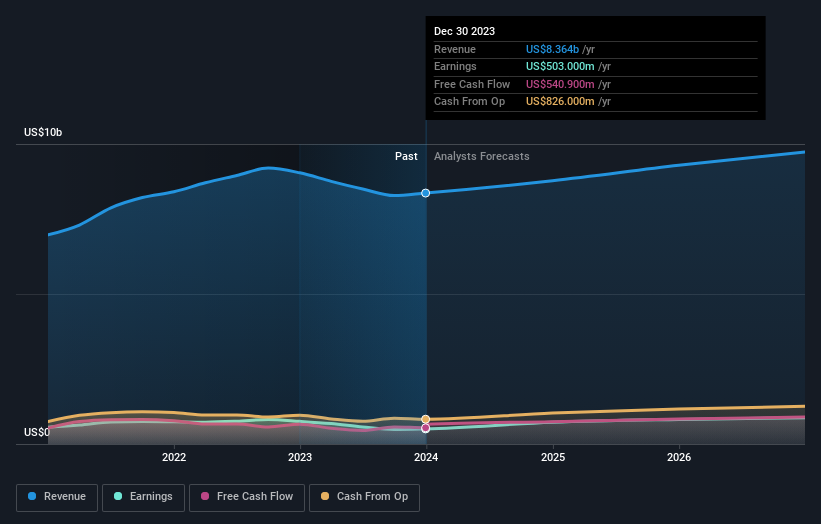Avery Dennison Corporation (NYSE:AVY) Annual Results Just Came Out: Here's What Analysts Are Forecasting For This Year
Avery Dennison Corporation (NYSE:AVY) last week reported its latest yearly results, which makes it a good time for investors to dive in and see if the business is performing in line with expectations. It looks like the results were a bit of a negative overall. While revenues of US$8.4b were in line with analyst predictions, statutory earnings were less than expected, missing estimates by 4.4% to hit US$6.20 per share. Earnings are an important time for investors, as they can track a company's performance, look at what the analysts are forecasting for next year, and see if there's been a change in sentiment towards the company. With this in mind, we've gathered the latest statutory forecasts to see what the analysts are expecting for next year.
Check out our latest analysis for Avery Dennison
Taking into account the latest results, the current consensus from Avery Dennison's eleven analysts is for revenues of US$8.78b in 2024. This would reflect a satisfactory 4.9% increase on its revenue over the past 12 months. Per-share earnings are expected to soar 44% to US$9.01. Before this earnings report, the analysts had been forecasting revenues of US$8.86b and earnings per share (EPS) of US$9.14 in 2024. The consensus analysts don't seem to have seen anything in these results that would have changed their view on the business, given there's been no major change to their estimates.
The analysts reconfirmed their price target of US$218, showing that the business is executing well and in line with expectations. There's another way to think about price targets though, and that's to look at the range of price targets put forward by analysts, because a wide range of estimates could suggest a diverse view on possible outcomes for the business. There are some variant perceptions on Avery Dennison, with the most bullish analyst valuing it at US$248 and the most bearish at US$154 per share. As you can see, analysts are not all in agreement on the stock's future, but the range of estimates is still reasonably narrow, which could suggest that the outcome is not totally unpredictable.
Looking at the bigger picture now, one of the ways we can make sense of these forecasts is to see how they measure up against both past performance and industry growth estimates. We can infer from the latest estimates that forecasts expect a continuation of Avery Dennison'shistorical trends, as the 4.9% annualised revenue growth to the end of 2024 is roughly in line with the 5.7% annual growth over the past five years. Compare this with the broader industry, which analyst estimates (in aggregate) suggest will see revenues grow 2.9% annually. So although Avery Dennison is expected to maintain its revenue growth rate, it's definitely expected to grow faster than the wider industry.
The Bottom Line
The most obvious conclusion is that there's been no major change in the business' prospects in recent times, with the analysts holding their earnings forecasts steady, in line with previous estimates. Fortunately, they also reconfirmed their revenue numbers, suggesting that it's tracking in line with expectations. Additionally, our data suggests that revenue is expected to grow faster than the wider industry. There was no real change to the consensus price target, suggesting that the intrinsic value of the business has not undergone any major changes with the latest estimates.
With that in mind, we wouldn't be too quick to come to a conclusion on Avery Dennison. Long-term earnings power is much more important than next year's profits. We have estimates - from multiple Avery Dennison analysts - going out to 2026, and you can see them free on our platform here.
You should always think about risks though. Case in point, we've spotted 1 warning sign for Avery Dennison you should be aware of.
Have feedback on this article? Concerned about the content? Get in touch with us directly. Alternatively, email editorial-team (at) simplywallst.com.
This article by Simply Wall St is general in nature. We provide commentary based on historical data and analyst forecasts only using an unbiased methodology and our articles are not intended to be financial advice. It does not constitute a recommendation to buy or sell any stock, and does not take account of your objectives, or your financial situation. We aim to bring you long-term focused analysis driven by fundamental data. Note that our analysis may not factor in the latest price-sensitive company announcements or qualitative material. Simply Wall St has no position in any stocks mentioned.

